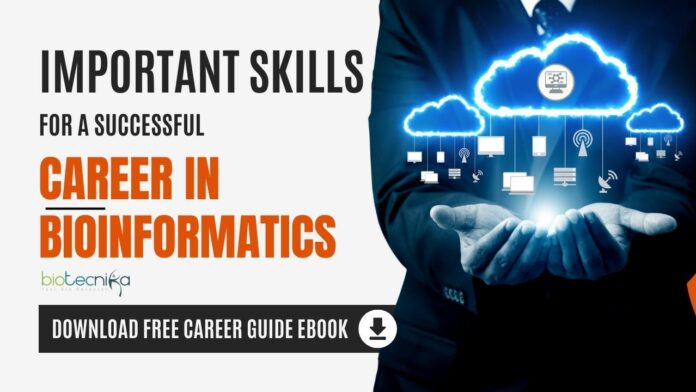Important Bioinformatics Skills Needed For Career in BIO-IT
Bioinformatics-based Research is exploding as we speak. Tonnes of Big data Biology driven projects are landing in the laps of Bioinformatics and Computational Biology Companies. And That’s the single most important reason why you must attain expertise in the field of Bioinformatics.
The interdisciplinary nature of bioinformatics brings together biology, information technology, and computer science. Since the analysis conducted in the interpretation of biological data has to be associated with a wide-ranging skill set, given the increasing demand for bioinformatics professionals, it is necessary for success to be achieved in this fast-changing field.
So in this article, let us dive into the skillsets needed for Bioinformatics.
1. Understanding Biological Principles
Molecular Biology and Genetics
A bioinformatics professional should have a very strong foundation in molecular biology and genetics. Irrespective of the type, analyzing biological data is founded upon knowledge of DNA, RNA, and protein structure and function. A person should have a good understanding of gene expressions, genetic variations, and molecular pathways to interpret results from bioinformatics.
As a bioinformatician, you will be dealing mainly with genetic data; these are sequences of DNA or RNA. Fundaments include the essential understanding of how genes are transcribed and translated to proteins and processes involved in regulation. This will assist you in defining a gene, predicting its function, and looking at diseases due to mutations.
Cell Biology and Physiology
Understanding cell physiology and cell biology helps understand the functions of genes and proteins in cells and organisms and is therefore indispensable for placing information derived from bioinformatics into context and meaningfully interpreting/deriving meaningful interpretations from your analyses. For example, knowledge about the pathways and mechanisms operating inside cells would be of help in the interpretation of gene expression data to identify potential drug targets.
Also, in examining various data on different tissues or organ systems, one has to have knowledge of physiology to understand how changes at the genetic/molecular level affect organisms in terms of function and health.
Download FREE Bioinformatics Career Guide ebook here
2. Proficiency in Computer Science
Programming Languages
Programming languages are a foundation for the discipline called bioinformatics. The most common among them are:

- Python is widely applied due to its ease of use and readability. It is just ideal for data analysis and scripting. The case of libraries developed to apply in bio information includes Biopython, Pandas, etcetera.
- R: R is a programming language that is used specifically in statistical computations. It is being used widely for doing bioinformatics analysis. It offers a wide range of packages, such as Bioconductor, which has tools to analyze genomic data.
- Perl: Perl is a language primarily used for text manipulation and hence has been widely used for bioinformatics scripting tasks. Because of the regular expressions, it is very suitable for parsing most of the biological data formats.
Data Structures and Algorithms
Great efficiency in data processing and analysis requires a good understanding of data structures and algorithms. Good performance in applications of bioinformatics demands a good understanding of how to efficiently organize and manipulate data. Typical data structures such as arrays, linked lists, and hash tables should be well understood. The basis is provided by algorithms for sorting, searching and sequence alignment.
Database Management
Given that in bioinformatics, one needs to deal with very vast amounts of data, knowledge of database management becomes essential. Knowledge of SQL and experience in relational databases, like MySQL or PostgreSQL, shall help one deal with and come up with queries of biological data. In addition, you should also have knowledge of NosQL databases such as MongoDB bearing in mind the state of data in an unstructured state as regards genomic sequences and their experimental results.
3. Data Analysis and Statistical Skills
Statistical Methods
Bioinformatics methodologies are all but completely reliant on the use of statistical techniques to gather and analyze data. Probability, testing hypotheses, and regression analysis are just a few of the concepts that comprise an integral part of the discipline. These are used for making biological inferences from data, determining the significance of results, and validating them. Expertise in the relevant statistical packages, especially Bioconductor in R, shall further add to analytical capabilities.
Machine Learning and Data Mining
Machine learning, and data mining techniques in bioinformatics, are increasingly important. These allow one to mine significant patterns or make predictions from complex biological data. It would be useful to learn algorithms such as clustering, classification, and neural networks. For example, machine learning can be applied in the prediction of protein structures, identification of disease genes, and cancer classification into subtypes based on their gene expression profiles.
Important Bioinformatics Skills
4. Bioinformatics Tools and Software
Sequence Analysis Tools
The ability to put sequence analysis tools into use helps in performing problems associated with DNA sequencing and alignment, annotation, etc. Most of these tools help get information from a given query. In our case, for instance, BLAST, Bowtie and Clustal Omega will enable transforming a raw sequence of data into useful biological knowledge for the biologists or a researcher. It has an enormous impact on the identification of the homologous sequences discussing genome assembly to Comparative-genomics.

Structural Bioinformatics Tools – Important Bioinformatics Skills
It deals with the study of 3D structures of biological molecules. There exist different tools designated as PyMOL, Chimera, and MODELLER that can be used in visualizing molecular structure. Besides, modeling can also be done. Through the utilization of such tools, the study of protein-ligand interactions, the prediction of mutation consequences, designing drugs, etc can be learned.
Genomics and Proteomics Software
Knowledge of computational tools that deal with genomics and proteomics is, therefore, of great importance in the analysis on a large scale of biological data. Commonly used tools in the field include GATK, the Genome Analysis Toolkit in genomics, and MaxQuant in proteomics. Some of the work that the tools can help perform include calling of variants, differential expression analysis, and quantification of proteins.
Download the FREE Bioinformatics Career Guide ebook
5. Interdisciplinary Collaboration
Communication Skills
For such a collaboration with differently skilled colleagues, effective communication is very important. A definite enhancement of teamwork and project success will be gained if one can explain a complex bioinformatics concept to biologists, but also to computer scientists and even to other stakeholders. In addition, communication is essential in writing of scientific papers, preparing reports, or presenting findings at conferences.
Project Management
Project management capabilities with which to coordinate interdisciplinary projects will help to give the individual knowledge in planning, executing, and managing bioinformatics projects that will ensure the timely completion of their tasks successfully. Budgeting, scheduling, and resource allocation skills are also helpful in conducting research projects and collaborations.
6. Keeping Up with Technological Advancements
Continuous Learning
It is a dynamic field, and hence one has to keep oneself abreast of all the latest developments. One should be involved in continuous learning. Online courses should be taken, workshops attended, and conferences frequented to update one skill. There are courses on bioinformatics as well as related subjects available at platforms like Coursera, edX, and Khan Academy.
Research and Development
Being involved in research and development, one is able to make a contribution towards the growth of bioinformatics. With research projects, publication of the results in scientific journals brings about great enhancement both in knowledge and credibility. This further leads to new insights and inventions that come about as a result of collaboration with other researchers and some degree of activity within the scientific community
7. Ethical and Legal Considerations
Data Privacy and Security
One should also be able to appreciate the ethical and legal concerns about data confidentiality and security. Confidentiality and integrity of the biological data should be guaranteed because it will help in maintaining public trust and also being compliant with regulations. One should be aware of data protection laws such as the General Data Protection Regulation, and GDPR in the manipulation of sensitive information.
Intellectual Property Rights
Knowledge of intellectual property rights, patent laws, etc., is very important to protect innovations in bioinformatics. Knowledge of related legal implications will guide you on how to manage the complexity of bioinformatics research and development work. You therefore need to know what should be protected and how to protect it as well as respect others’ intellectual properties.
8. Networking and Professional Development
Professional Associations
Professional societies include such things as the International Society for Computational Biology, or ISCB; Bioinformatics Society of India or BSI. Groups like these usually offer many resources and networking possibilities via conferences and workshops. One enthusiastic member can help you keep up to date with the latest events in the field of computation while networking information with other peers.
Mentorship and Collaboration
It can be motivating to have a mentor from experienced personnel in bioinformatics. Mentors can explain career paths and suggest which skills will be required and available research opportunities. Working with peers and meeting new experts can provide new ideas and methods for solving problems. Thus, such networks will enable a person to secure jobs and collaboration easily.
Needless to say, the role of bioinformatics will be very well diversified, combining skills in biological sciences with computer science, data analysis, and interdisciplinary working. Therefore, staying up-to-date on core competencies and being familiarized with technology developments is simply a requirement for succeeding in such a dynamic and rewarding profession or field. Continuous learning, networking, and professional growth are also some of the primary factors that will help you progress even better in the field of bioinformatics.
Important Bioinformatics Skills
Additional Tips for Success

- Stay Curious and Open-minded: The field of bioinformatics is dynamic, and a curious mind will keep you interested and motivated all the time. You should always be willing to explore new techniques and tools and explore new areas of research.
- Develop Problem-solving Skills: Basically, bioinformatics means using computational tools to approach a lot of the biological questions that are complex. Strong problem-solving skills will enable the student to think of new solutions and also help to overcome research problems.
- Gain Hands-on Experience: Practical experience in bioinformatics is quite valuable. This can be achieved by internships, research projects, and collaborative studies in which one could apply skills to real-life situations.
- Embrace Multidisciplinarity: Bioinformatics is inherently multidisciplinary. Embrace the diversity of the field and strive to integrate knowledge from biology, computer science, and other related disciplines.
- Build a Portfolio: This means that making a portfolio can serve as an effective tool in attracting the attention of potential employers who appreciate experience and skills.
Hence, by focusing on such parameters and by continuously innovating, one can pursue a fruitful career in this area of bioinformatics. This might be a gruelling ride, but the payoffs will certainly be worth the effort because not only does it allow one to work on the edge in science and medicine but also contributes significantly towards breakthroughs.
Download the Bioinformatics Career Guide ebook:






































